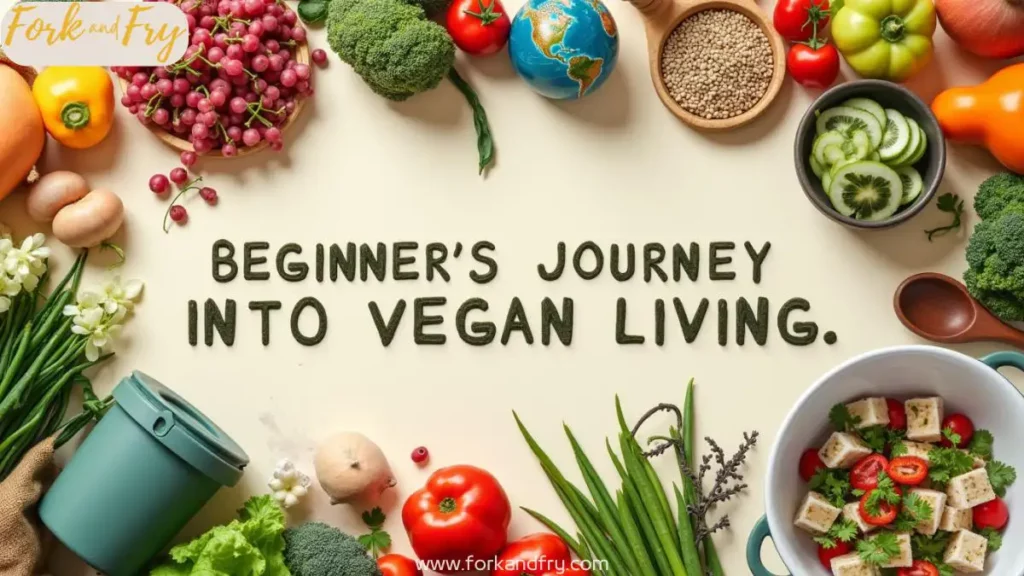Last updated on February 24th, 2025 at 06:45 pm
Table of Contents
Looking out at the green landscape, I think about how our food choices affect the planet. Animal agriculture is harming our environment, causing 14.5% of global greenhouse gas emissions. Yet, veganism offers hope for a better future.
Choosing a plant-based diet is more than a personal choice. It’s a movement that can change our environmental crisis. By going vegan, we can cut food-related emissions by up to 70%. This shows how big an impact our food can have on the planet.
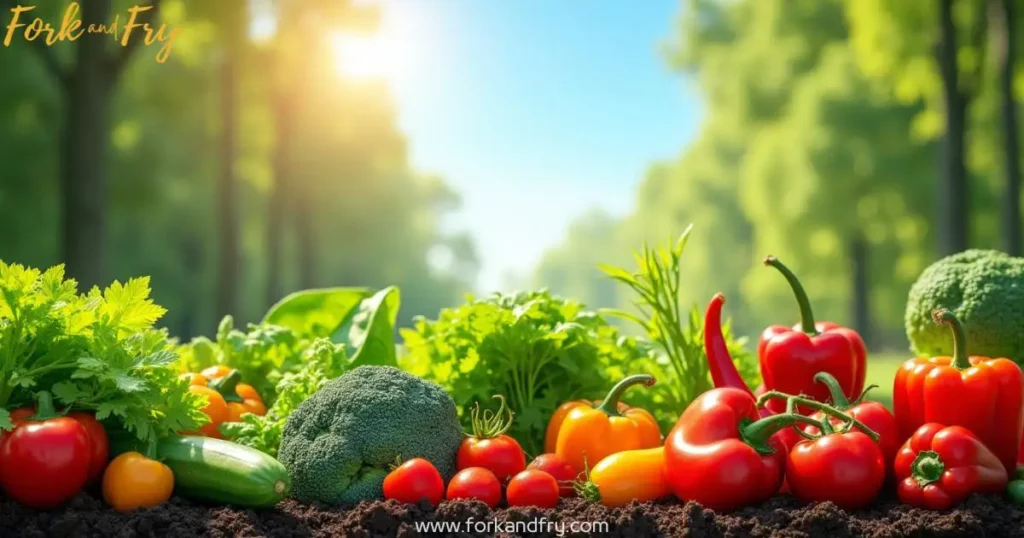

Key Takeaways
- Veganism significantly reduces greenhouse gas emissions, water usage, and land degradation associated with animal agriculture.
- A plant-based diet aligns with circular economy principles, promoting efficient resource use and waste reduction.
- Widespread adoption of veganism could help preserve critical ecosystems like the Amazon rainforest, vital for climate regulation.
- Veganism offers a compassionate approach to animal welfare, reducing the demand for factory farming.
- Transitioning to a vegan lifestyle can lead to long-term health benefits and disease prevention.
Understanding the Environmental Impact of Animal Agriculture
Animal agriculture has a big impact on the environment. It contributes to greenhouse gas emissions and uses a lot of land and water. These practices are major factors in the climate crisis.
Global Greenhouse Gas Emissions
Animal agriculture is responsible for 14.5% to 18% of global greenhouse gas emissions. This is more than the emissions from all global transportation. Beef, lamb, and mutton production are especially high in emissions compared to plant-based foods.
Land and Water Resource Depletion
Animal agriculture takes up 83% of all agricultural land. It also uses 26% of the Earth’s ice-free land for grazing. Only 4% of US land is for human plant consumption. This is not sustainable and depletes vital resources.
Deforestation and Habitat Loss
More than 80% of Amazon deforestation is for animal agriculture. Millions of acres are cleared for cattle ranching and feed crops. This deforestation destroys natural habitats and threatens biodiversity worldwide.
| Environmental Impact | Animal Agriculture | Plant-Based Alternatives |
|---|---|---|
| Greenhouse Gas Emissions | 14.5% – 18% of global emissions | Significantly lower emissions |
| Land Use | 83% of all agricultural land | Potential to reduce farmland by over 75% |
| Water Consumption | 55% of water consumed in the US | Requires 13x less water than animal agriculture |
| Deforestation | 80% of Amazon deforestation | Preserves natural habitats and biodiversity |
The environmental impact of animal agriculture is huge. We need to switch to plant-based diets fast. This will help reduce emissions, save resources, and protect ecosystems.
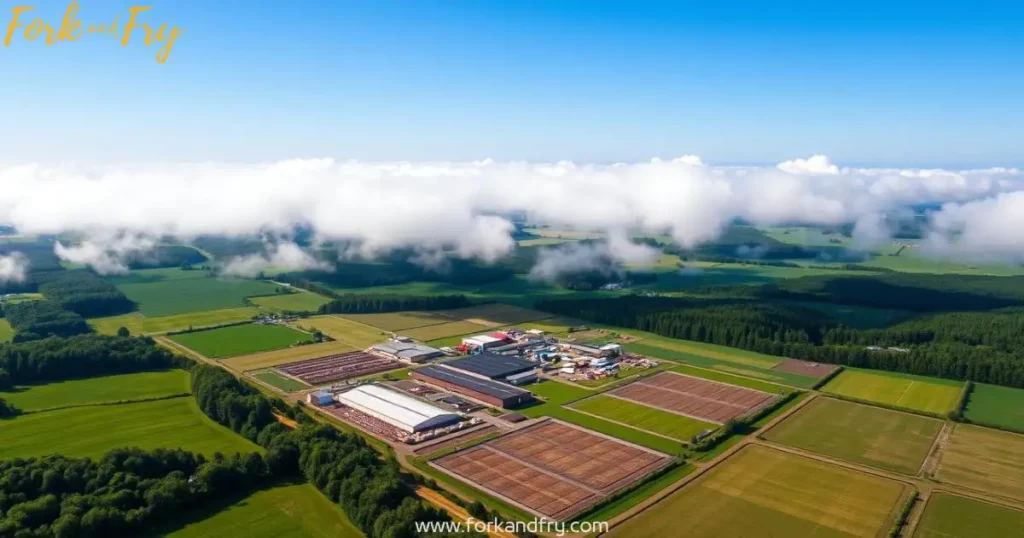

The Rise of Veganism in Modern Society
Veganism has become more popular in recent years. People are choosing plant-based diets to help the environment and improve their health. This choice is spreading worldwide, aiming to make food systems more sustainable.
In the UK, the number of vegans has grown from 150,000 to 542,000 in ten years. Most vegans are women, making up 63% of the total. The Veganuary campaign shows a similar trend, with 84% of participants being female and 60% under 35.
Businesses are also changing to meet the demand for vegan options. Big names like Marks & Spencer, Pret a Manger, and Wagamama now offer vegan choices. Startups like Vurger quickly raised £150,000, showing the potential of veganism.
Social media and documentaries like “Cowspiracy” have helped popularize veganism. This has led to more vegan events and festivals. The Blackpool Vegan and Green Festival, for example, attracts visitors from the UK and Spain.
“The shift towards veganism is not just about personal choice, but also about environmental stewardship and promoting sustainable food systems.”
The rise of veganism shows growing concern for the planet. As we move towards a sustainable future, veganism and plant-based diets will be key. They help reduce our environmental impact and promote a healthier food system for all.
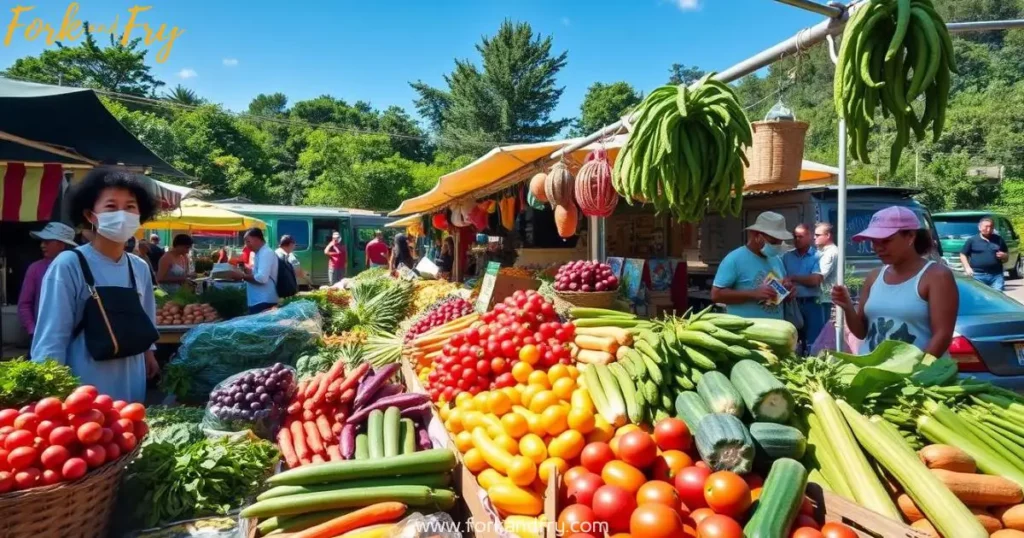

Plant-Based Solutions for Climate Change Mitigation
Plant-based diets are a key solution to fight climate change. They help us use less animal products, which cuts down our carbon footprint. This also saves our natural resources.
Reducing Carbon Footprint Through Diet
Switching to plant-based diets greatly reduces greenhouse gas emissions. Research shows it can cut down land use by 76% and emissions by 49%. This is a big step in fighting climate change, as animal farming is a big polluter.
Preservation of Natural Resources
Plant-based diets also help save our natural resources. They need only a third of the land, water, and energy compared to meat and dairy. This helps protect our ecosystems and keeps our food system sustainable.
Sustainable Agricultural Practices
Sustainable farming is crucial for plant-based solutions. Practices like crop rotation and using fewer pesticides help. They also improve soil health and reduce emissions. Pulses, a big part of plant-based diets, are especially good at fixing nitrogen, which cuts down on fertilizer use.
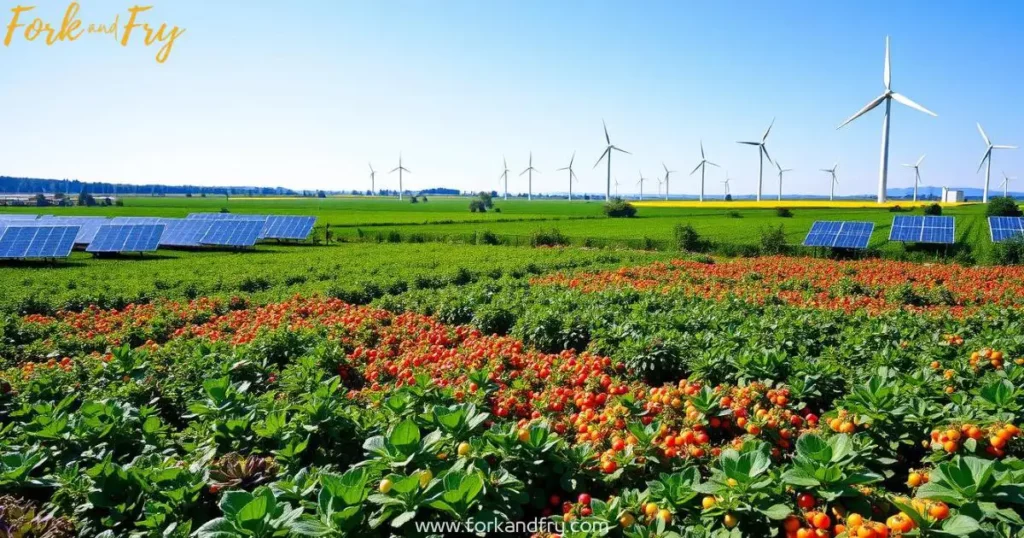

By choosing plant-based diets and sustainable farming, we move closer to a climate-resilient future. This approach not only cuts emissions but also saves resources and boosts biodiversity. It makes our food system more sustainable and fair for all.
Global Food Security and Resource Distribution
The world’s food system has big challenges. Despite new farming tech, hunger and malnutrition affect millions. Animal farming uses a lot of resources but doesn’t feed everyone.
In 2021, 828 million people, or 10% of the world, faced hunger. Also, 2.3 billion people, or 29.3% of the world, were food insecure. In the U.S., 13.5 million households, or 10.2%, struggled with food insecurity in 2021.
Animal farming is very inefficient. It takes 16 pounds of grain to make just 1 pound of beef. Plant-based food uses much less resources. One acre can grow 2-20 times more plant food than animal food.
Switching to plant-based food systems could change the game. It could help feed more people and make food more accessible. This shift could make the global food system fairer and more sustainable.
| Country | Food Insecurity Rate |
|---|---|
| Botswana (2018-2019) | 50.8% |
| Myanmar (2022) | 25% (13.2 million individuals) |
| United States (2021) | 10.2% (13.5 million households) |
Plant-based solutions are key to a better food system. By eating less animal products, we can help the planet and feed more people. This way, we can improve food security for everyone.
The Health Benefits of Plant-Based Living
Vegan nutrition is more than a trend. It’s a shift towards healthier, sustainable living. Studies show plant-based diets lower chronic disease risk, benefiting both individuals and the planet.


Disease Prevention and Management
Plant-based diets cut heart disease, type 2 diabetes, and some cancers risk. A 2023 study in the Journal of the American Medical Association found big benefits. Plant-based living fights inflammation and aids in weight management, helping prevent and manage diseases.
Nutritional Advantages
Vegan diets are full of fiber, vitamins, minerals, and antioxidants. These support immune function and health. Vegans and vegetarians get more magnesium, potassium, iron, and vitamins than meat-eaters, while eating less fat. These foods nourish the body and promote well-being.
Long-term Health Outcomes
Switching to plant-based diets offers many health benefits over time. A review of 87 studies showed vegan or vegetarian diets aid in weight loss. They also lower heart disease, high blood pressure, diabetes, and obesity rates. Plant-based diets reduce cholesterol and saturated fat, boosting heart health and longevity.
Choosing vegan nutrition benefits health, the environment, and animal welfare. As more people adopt plant-based living, the future of sustainable, healthy lifestyles looks bright.
| Chronic Disease | Reduced Risk with Plant-Based Diet |
|---|---|
| Heart Disease | Lower risk of heart disease through reduced cholesterol and saturated fat intake |
| Type 2 Diabetes | Improved blood sugar control and reduced risk of developing type 2 diabetes |
| Certain Cancers | Decreased risk of colon, breast, and prostate cancer due to higher intake of antioxidants and fiber |
“Eating primarily nutrient-dense plant-based foods like vegetables, fruits, whole grains, beans, legumes, and nuts is associated with a lower risk of death from cardiovascular diseases.”
Sustainable Food Production Systems
https://en.wikipedia.org/wiki/Vegan_organic_agricultureGlobal challenges like climate change and resource depletion make sustainable food systems crucial. Plant-based farming is a key solution, needing less land, water, and energy than animal agriculture. It uses organic waste to feed future crops, cutting down on synthetic fertilizers and pesticides.
Plant-based agriculture combines techniques like crop rotation and agroforestry. These methods improve soil health and biodiversity. They also help farmers reduce their carbon footprint and ensure food security for the long term.
| Sustainable Agriculture Practices | Benefits |
|---|---|
| Crop Rotation | Improves soil fertility, controls pests and diseases, and reduces the need for synthetic inputs |
| Intercropping | Enhances biodiversity, maximizes land use efficiency, and reduces weed growth |
| Agroforestry | Sequesters carbon, provides habitats for wildlife, and diversifies income streams for farmers |
As more people learn about the environmental impact of their food, demand for sustainable options grows. By adopting these new methods, we can create a future where sustainable agriculture, food production, and plant-based farming are common. This will benefit both our planet and its inhabitants.
“Veganic farming offers a climate-conscious method of food production by removing animals from the entire supply chain.”
Ethical Considerations and Animal Welfare
As more people want animal-based products, caring for animals has become key. Veganism is a way to treat animals better. It means not using products made from animals.
Factory Farming Impact
The factory farming world is known for being cruel. In the U.S., 95% of egg-laying hens are in small cages. They often get sick or dehydrated.
Also, 200 million male chicks are killed each year. They are suffocated or ground up alive.
Wildlife Conservation
Animal farming hurts more than just factory farms. In the U.S., over 3 million animals are killed each year. This includes endangered species and pets.
Choosing vegan helps wildlife. It reduces harm to their homes and keeps species alive.
Compassionate Consumer Choices
Choosing what we eat wisely helps animals and the planet. Vegans look for products that are kind to animals. This choice helps companies be better too.
| Animal Welfare Concern | Impact |
|---|---|
| Battery Cages for Egg-Laying Hens | 95% of hens live in cramped, inhumane conditions |
| Male Chick Culling | 200 million male chicks killed annually in the egg industry |
| Wildlife Killings | Over 3 million animals, including endangered species, killed yearly by Wildlife Services |
“Adopting a vegan diet is considered the only truly humane choice when considering animal welfare in the food industry.”
Choosing vegan helps animals and our planet. It’s a big step towards a kinder world.
The Economic Benefits of Plant-Based Industries
The plant-based economy is booming, opening up many economic chances. It’s changing how we see food, farming, and even health care. This growth is thanks to new vegan products and green business ideas.
More people want to eat plant-based, which means more jobs in the vegan food world. This industry now adds $5.6 billion to the U.S. economy every year. It’s creating thousands of jobs and boosting the economy.
But it’s not just about food. Plant-based industries are also making businesses more eco-friendly. New green packaging and farming tech are cutting down on waste and creating jobs. For example, big fast-food chains adding vegan options shows they’re listening to what people want.
Plant-based living is good for more than just food. Eating plant-based can save a lot on health costs. Studies say it can cut medical spending by 15% and outpatient costs by 13% compared to meat-eaters. Plus, using less land for farming can help other parts of the economy grow.
The plant-based economy is more than a passing trend. It’s a big change that could make our future better, fairer, and greener. As more people choose vegan and green options, the plant-based industry will keep growing. It’s set to be a big part of a sustainable economy.
“The plant-based food sector has generated 55,634 well-paying jobs across the U.S., with an average annual salary of $59,300.”
The benefits of plant-based go beyond jobs and money. It can also save a lot on health costs. Eating plant-based can cut medical spending by 15% and outpatient costs by 13% compared to meat-eaters. Also, using less land for farming can help other parts of the economy grow.
The rise of the plant-based economy is a big deal. It’s not just a trend but a major change. As more people choose vegan and green options, the plant-based industry will keep growing. It’s set to be a big part of a sustainable economy.
Conclusion
Veganism is a great way to tackle big environmental, health, and ethical issues. It helps reduce our impact on the planet, makes food more secure, boosts our health, and protects animals. Moving towards a sustainable future is a team effort, aiming for a kinder world.
More Americans are choosing vegan diets, showing the lifestyle’s many benefits. It cuts down on harmful emissions and saves natural resources. Plus, vegan diets are linked to better health, like preventing diseases and improving heart health.
But, it’s key to have a well-thought-out vegan diet, especially for kids and teens. We need to watch out for vitamin B12 and zinc to keep everyone healthy. By choosing a plant-based life and solving nutritional issues, we can make a better future for all.
FAQ
What are the main environmental benefits of a vegan lifestyle?
Adopting a vegan diet can significantly lower your carbon footprint. It saves water and land, and helps prevent deforestation. Eating plant-based can cut greenhouse gas emissions from food by up to 70%.
How does animal agriculture contribute to climate change?
Animal agriculture is a big source of greenhouse gas emissions, making up 14.5% of global emissions. It also produces 65% of nitrous oxide, a very potent gas. The industry uses 70% of agricultural land and over 50% of freshwater, leading to deforestation.
Why is veganism gaining popularity in modern society?
More people are choosing veganism due to environmental, health, and ethical reasons. Obesity affects over 42% of the U.S. population. The UN says we need to adopt alternative proteins by 2030 to fight climate change.
How can plant-based diets help mitigate climate change?
Plant-based diets can cut greenhouse gas emissions from food by up to 70%. They need one-third of the land, water, and energy compared to meat and dairy. Practices like crop rotation and less pesticide use also help the environment.
How can veganism improve global food security and resource distribution?
Animal agriculture is not efficient, needing 16 pounds of grain for 1 pound of beef. Switching to plant-based diets could feed more people, solving hunger and food insecurity. Plant-based systems are more efficient, producing more food with fewer inputs.
How does a plant-based diet benefit your health?
Plant-based diets lower the risk of heart disease, type 2 diabetes, and some cancers. They are full of fiber, vitamins, minerals, and antioxidants, boosting immune function and health. A 2023 study found that a plant-based diet can reduce chronic disease risk.
How can plant-based agriculture be more sustainable?
Plant-based food systems are more sustainable, needing less land, water, and energy than animal agriculture. They can be part of closed-loop systems, where waste is composted to feed future crops. Practices like crop rotation and agroforestry improve soil health and biodiversity.
How does veganism address ethical concerns about animal welfare?
Veganism promotes compassion towards animals, reducing demand for factory farming. It supports wildlife conservation by reducing habitat destruction. By choosing vegan options, individuals help create a more ethical food system.
What are the economic benefits of the plant-based industry?
The plant-based food industry is growing fast, creating new jobs and opportunities. It includes innovative products, sustainable agriculture, and eco-friendly packaging. Switching to plant-based diets can also lower healthcare costs and support local economies and small farmers.

